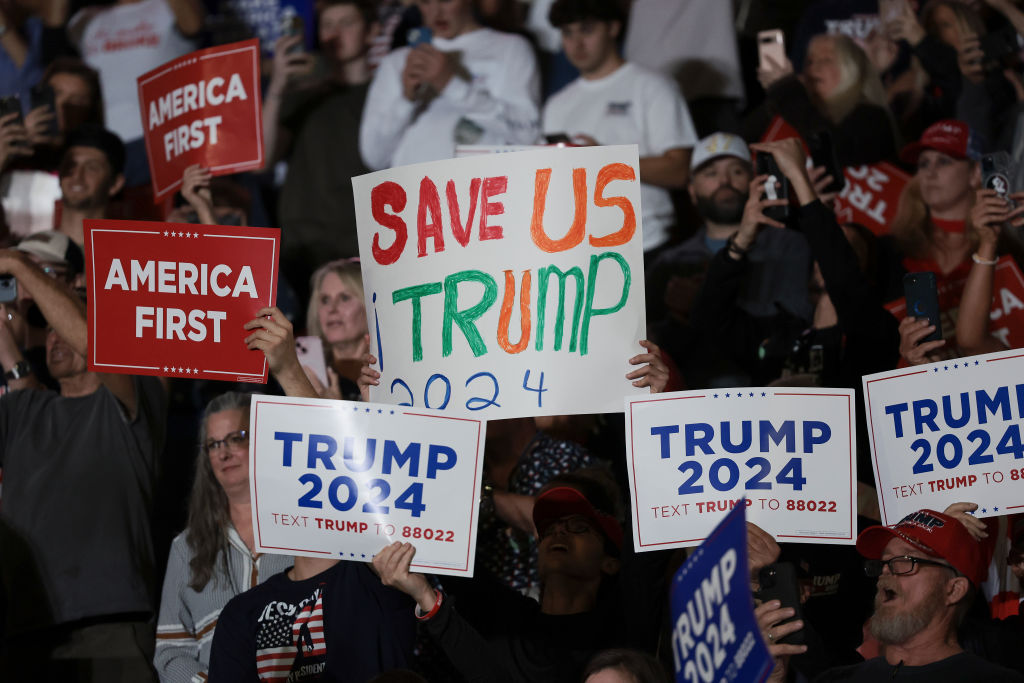
In late 2023, voters in Argentina and the Netherlands elected right-wing populists promising dramatic changes. But these two countries aren’t alone. Around the world, nations have become deeply polarized. Tense elections involving far right candidates have occurred across the globe in Peru, Israel, and Italy, among others. And, of course, the United States is headed for another nail-biter of an election in 2024.
At the same time, violent conflicts have escalated. A recent report found that in 2022 deaths from internal and external conflicts increased 96% from the previous year. The carnage in Israel and Gaza will likely drive these numbers even higher.
What could be the cause of these disturbing trends?
We appear to be in the midst of an era of what I label “defensive nationalism.” Defensive nationalism is a form of national-populism, or a people’s movement focused on protecting the nation against globalizing forces, whether in the form of trade, finance, or immigration.
Defensive nationalist movements emerge when revolutionary changes in transportation and communications shorten time and reduce distance. These globalizing changes produce wealth and internationalism. But they also dramatically disrupt societies, generating widespread unease and apprehension. Populist politicians capitalize on the generalized fear, painting international forces as a threat that must be countered. Economic protectionism is made to seem paramount, diplomacy takes a back seat, and the military becomes the bulwark of the nation.
The result is an inward populist turn that pushes many people toward radical domestic politics and nations towards violence.
Read More: A Make-or-Break Year for Democracy Worldwide
The first era of defensive nationalism began in the 1860s after dramatic advances in railroads, steamships, printing, and the telegraph of the Second Industrial Revolution linked the world as never before.
The rapid expansion of railways made toilsome mule-drawn trains and stagecoaches obsolete. Overland travel was democratized. Newspapers and journals could now be widely and rapidly distributed. Media sales soared across Europe and the United States. Even mail carriage was transformed. For example, in the 1850s, most Americans received fewer than five letters annually; by 1900, they averaged 94 pieces of mail.
Steamships altered overseas travel as profoundly. Before the 1860s, oceanic travel was arduous, painfully slow, and costly. Few people willingly chose to emigrate to new continents. The largest movement of peoples across the seas occurred by brutal force, through the Atlantic slave trade. But with the advent of steamships, by the 1880s intensive emigration had spread from every corner of the globe.
At the same time, the first intercontinental telegraph wire was laid in 1858, connecting North America to Europe. News across the Atlantic now flowed at the speed of an electrical impulse. Soon, telegraph cables were laid around the world. Accompanying the telegraph was tickertape. Traders had “up-to-the-minute” access to stock, gold, grain, cotton, and oil quotations. Metal markets, ship brokering, and insurance became global businesses, and capital markets grew internationally.
In this new age of steel and steam, transatlantic trade costs dropped by roughly 60%. From 1870 to 1900, an unprecedented volume of goods was conveyed, at unprecedented speeds, and with greater efficiency.
Read More: Elites Who Want to Fix the World's Problems Should Start By Looking in the Mirror
The Gilded Age, as these decades came to be known, began with wonderment at technology’s astonishing ability to connect peoples and spread prosperity. But the bright hopes for a new era of peace and good will were quickly eclipsed by a dramatically polarized world that ultimately produced communism, fascism, and World Wars.
The technological revolutions that connected the globe destroyed existing social structures. Industrialization uprooted traditional agriculture and artisan trades. It brought forth unprecedented levels of urbanization with never-before-seen slum conditions and led to deepening inequality.
Added to this, unconstrained international speculation sparked global economic crises that further destabilized people’s lives. The first global financial panic came in 1873, when international wheat prices plummeted. Banking across Europe imploded, and pandemonium broke out on Wall Street. A decade-long, world-wide depression ensued. In 1893, the world was walloped by a second panic and depression that hit the United States particularly hard.
At the same time, the first form of mass "fake news" materialized, known as “Yellow Journalism.” With reduced printing costs and rapid information sharing came fierce competition over emerging media markets. To capture market share, publishers emphasized lurid scandals and dangerously blurred fact and fiction. William Randolph Hearst’s New York Journal was even accused of triggering the Spanish-American war by publishing unfounded claims that a Spanish explosive device destroyed the American warship, the U.S.S. Maine.
All these forces culminated in protectionist politics.
The world’s first restrictive immigration laws were passed. In the 1880s, the United States, Canada, and Australia banned entry to Chinese laborers. Soon after immigration restrictions were adopted in Denmark, Germany, Argentina, and Brazil. By the 1890s, across Europe and the United States poor European immigrants were subject to surveillance, arrest, and mob violence. Over the following three decades, immigration restrictions in the United States became more expansive, while in Europe several states, including Ottoman-Turkey, Romania, and Russia, expelled or violently propelled the emigration of ‘unwanted’ populations.
Economic nationalism gained ascendance. Almost as soon as international trade had been liberalized, anti-trade tariffs were instituted across Europe. By the 1880s, protectionist policies were adopted in Russia, Austria-Hungary, Spain, France, and Sweden. But the era’s highest tariffs were adopted by the United States, with the passage of the McKinley Tariff Act of 1890 that included duties on imports as high as 49.5 percent.
Advanced societies became polarized. From the 1890s to the 1910s, socialist populist movements flourished that sought to protect farmers and factory workers from industrialists, bankers, and the corrupt elite. So too did pre-fascist movements that propagated a racialized version of nationalism. The most extreme form of these movements, the so-called völkisch movements, idealized the wholesomeness of the heartland and traditional peasant society (the “folk” or “volk” in German), while disparaging the modern city as a racially mixed cesspool threatening the nation’s purity.
Thus ended the first liberal global order—at its height in the 1870s and finished off by the assassin’s bullet that felled Archduke Franz Ferdinand in 1914, sparking World War I.
Read More: Why So Many Politicians Are Talking About World War III
Today, we appear to be undergoing similar changes.
Transportation and communications technologies have once again compressed time and space, accelerating and democratizing the spread of information, increasing prosperity, and connecting peoples and economies in previously unfathomable ways.
Yet, as in the last century, these positive changes have produced negative effects. Since the 1990s, waves of migration not seen in a hundred years have created destabilizing demographic shifts. Offshoring turned thriving industrial centers to rust. The complex global financial system has bred contagious economic crises. New forms of mass communication now threaten democracy globally. Even today’s extreme wealth concentration is on par with the Gilded Age.
And so, nations are again turning inward. The world has been engulfed by an anti-global, anti-immigrant backlash. International systems are feared, economic protectionism has surged, and societies are once again splitting into opposing political camps.

Over the past two decades, national populists have won an increasing percentage of the vote share. In Spain, populist parties roughly doubled their share of votes between 2015 and 2019. In Belgium and France, both right- and left-leaning populist parties made advances. Elsewhere, much of the gains are on the right. In the 2022 Italian election, the right-wing populist party, Brothers of Italy, secured the highest vote share of any single party. So did the Swedish nationalist right-wing party, the Sweden Democrats, emerging as that nation’s second-most popular party in 2022. In the Netherlands, right-leaning populist parties garnered around 16% of the vote in 2021. In the United States, an extreme right-wing faction of the Republican Party, the House Freedom Caucus, almost doubled their congressional seats, from 29 in 2016 to 46 in 2022.
Defensive nationalism seems here to stay. This is worrisome. Dysfunctionally polarized domestic politics, decreased trust in the international order, and a "my-nation-first" ideology present a recipe for conflict. We have witnessed this with Putin’s war on Ukraine, Xi Jinping’s saber rattling in the South China seas, and Netanyahu’s brutal bombardment of Gaza.
Unfortunately, political polarization, rising fascism, and violent conflict are trends that do not appear to be abating any time soon. If history is our guide, we should brace ourselves for more of the same.
B. S. Rabinowitz is an Associate Professor of Political Science at Rutgers University, Camden and author of the book, Defensive Nationalism: Explaining the Rise of Populism and Fascism in the 21st Century.
Made by History takes readers beyond the headlines with articles written and edited by professional historians. Learn more about Made by History at TIME here. Opinions expressed do not necessarily reflect the views of TIME editors.
Correction: The original version of this story mischaracterized the death of Archduke Franz Ferdinand. He was killed by an assassin, not an anarchist.
More Must-Reads from TIME
- Cybersecurity Experts Are Sounding the Alarm on DOGE
- Meet the 2025 Women of the Year
- The Harsh Truth About Disability Inclusion
- Why Do More Young Adults Have Cancer?
- Colman Domingo Leads With Radical Love
- How to Get Better at Doing Things Alone
- Michelle Zauner Stares Down the Darkness
Write to B. S. Rabinowitz / Made by History at madebyhistory@time.com
